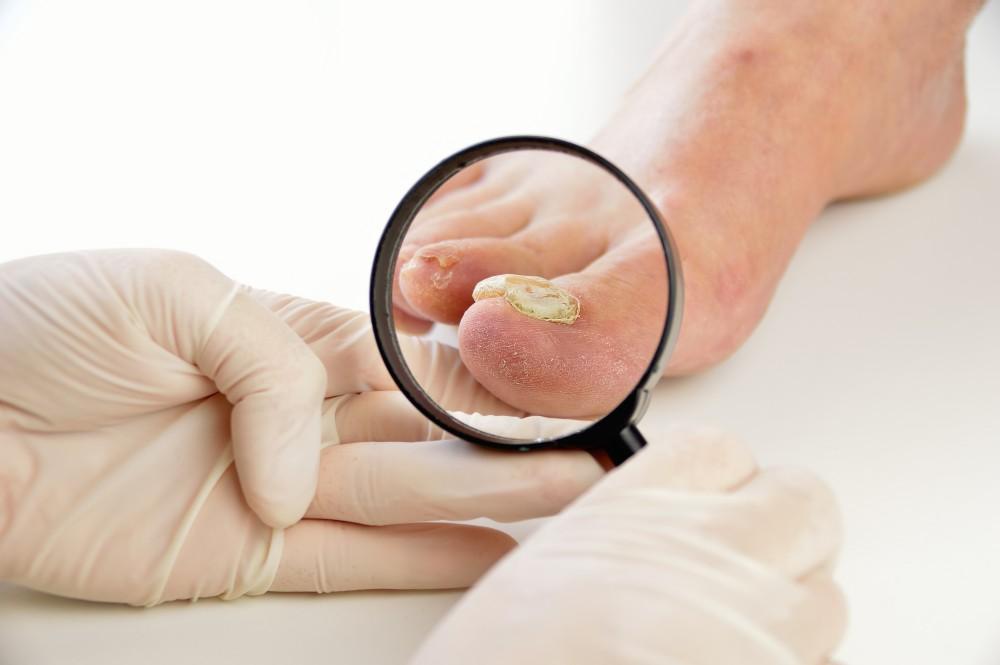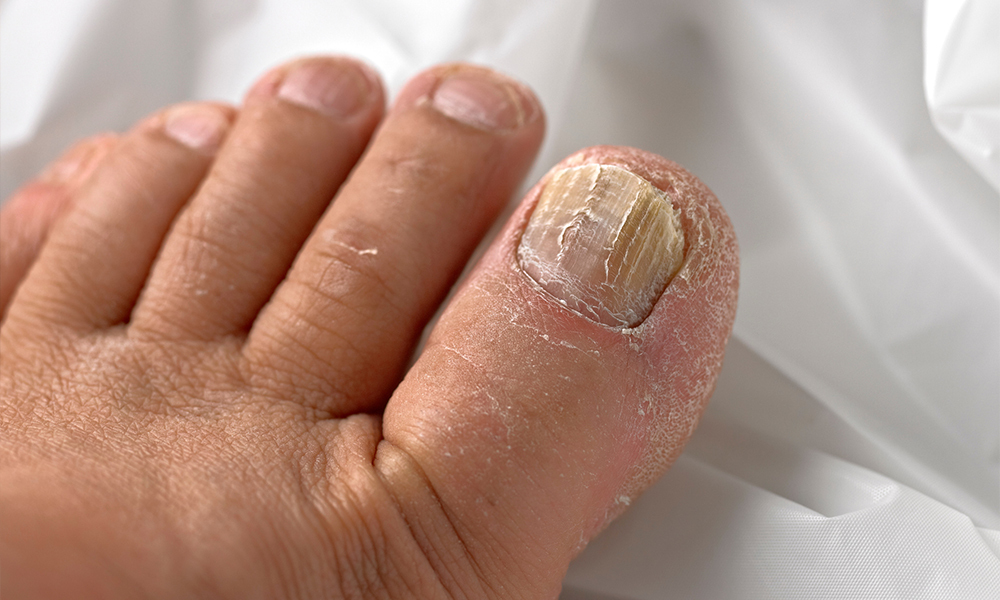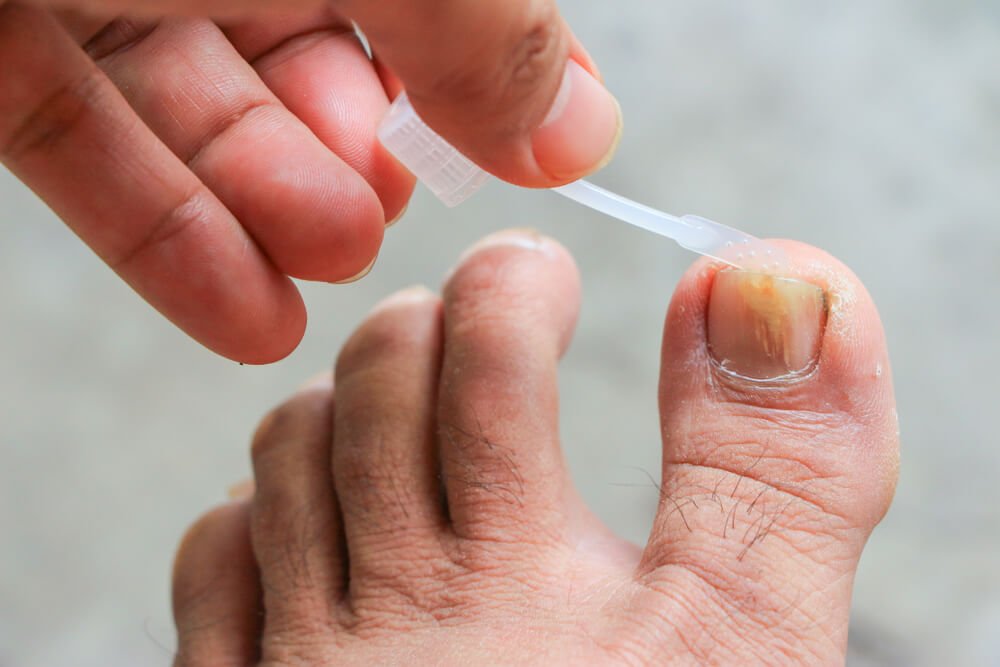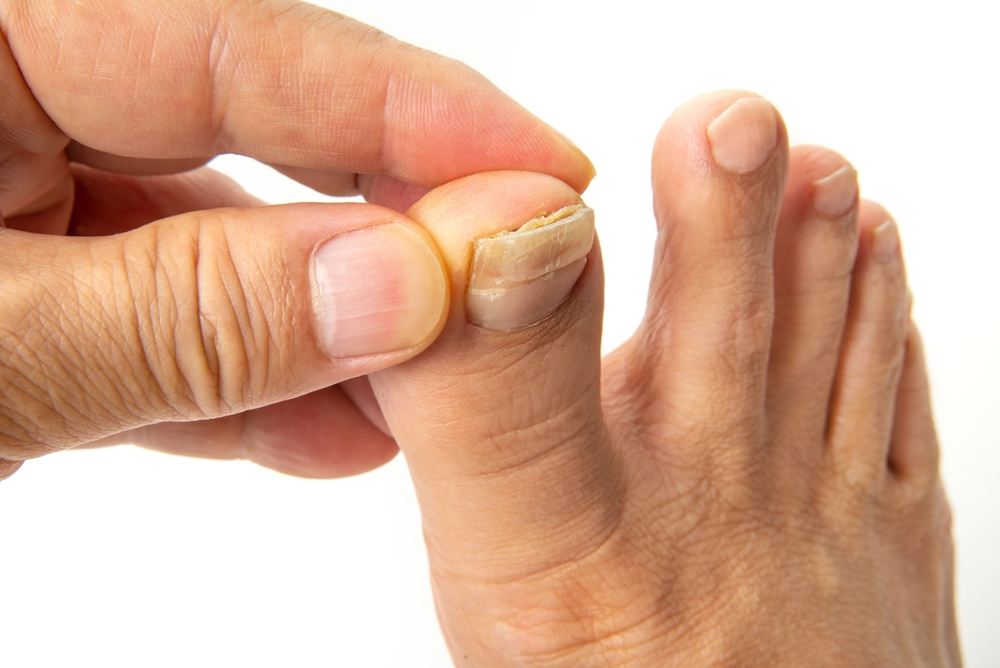Introduction

Nail fungus, also known as onychomycosis, is a common fungal infection that affects the nails. It is characterized by the thickening, discoloration, and brittleness of the nails. One important aspect to understand about nail fungus is its contagious nature. Being aware of how nail fungus spreads and the precautions to take can help in preventing its transmission. This article provides insights into the contagious nature of nail fungus, its signs and symptoms, causes, modes of transmission, prevention and hygiene practices, as well as medical treatments and self-care tips for managing the infection effectively. By implementing these measures, individuals can minimize the risk of spreading nail fungus to others and maintain healthy nails.
Understanding Nail Fungus And Its Contagious Nature
Nail fungus, also known as onychomycosis, is a common fungal infection that affects the nails. It is important to understand that nail fungus is highly contagious and can easily spread from person to person. This is because the fungus thrives in warm and moist environments, making places like public showers, pools, and gyms common breeding grounds for the infection. Additionally, sharing personal items such as nail clippers, towels, and shoes can also contribute to its spread. It is crucial to take necessary precautions to prevent the transmission of nail fungus and maintain good personal hygiene.
Common Signs And Symptoms Of Nail Fungus
Common signs and symptoms of nail fungus include:
- Thickened nails: Infected nails may become thicker and harder than usual.
- Discoloration: The nails may develop a yellow, brown, or white discoloration.
- Brittle nails: Infected nails tend to become brittle and easily break or crumble.
- Distorted shape: The shape of the nails may become distorted or change in appearance.
- Foul odor: Fungal infections can cause a foul smell to emanate from the affected nails.
- Pain or discomfort: In some cases, nail fungus can cause pain or discomfort, especially when pressure is applied.
If you notice any of these symptoms, it is important to consult a healthcare professional for an accurate diagnosis and appropriate treatment.
Causes And Risk Factors

Nail fungus, also known as onychomycosis, is caused by various types of fungi that thrive in warm, moist environments. The fungi enter the skin through tiny cuts or breaks, infecting the nails and leading to the development of nail fungus. Several risk factors can increase the likelihood of contracting nail fungus, including older age, excessive sweating, previous history of athlete’s foot, walking barefoot in damp public areas, minor skin or nail injuries, underlying health conditions such as diabetes or a weakened immune system. It is important to be aware of these risk factors and take preventive measures to avoid fungal infections.
Causes Of Nail Fungus
Nail fungus is caused by various types of fungi that thrive in warm, moist environments. These fungi can enter the skin through tiny cuts or breaks, infecting the nails and leading to the development of nail fungus. Common causes of nail fungus include:
- Exposure to fungal sources: Walking barefoot in damp public areas such as gyms, swimming pools, and locker rooms can increase the risk of fungal infection.
- Fungal skin infections: Having a previous history of athlete’s foot or other fungal skin infections can put you at a higher risk of developing nail fungus.
- Minor skin or nail injuries: Any small cuts, scrapes, or nail damage can create an entry point for fungi to invade the nails.
- Excessive sweating: Increased sweating and trapped moisture in the socks and shoes can create an ideal environment for fungi to thrive.
- Underlying health conditions: Certain health conditions like diabetes or a weakened immune system can weaken the body’s defenses against infections, making it easier for nail fungus to take hold.
By understanding the causes of nail fungus, individuals can take steps to prevent its development and avoid the spread of this contagious infection.
Factors That Increase The Risk Of Contagious Fungal Infections
Several factors can increase the risk of developing contagious fungal infections, including nail fungus. These risk factors include:
- Poor hygiene: Not maintaining proper hygiene, such as not washing hands regularly or not keeping nails clean and dry, can increase the risk of fungal infections.
- Sharing personal items: Sharing items like nail clippers, towels, or shoes with someone who has a fungal infection can lead to the spread of the fungus.
- Wearing tight or improper footwear: Tight shoes or footwear that doesn’t allow proper ventilation can create a warm and moist environment that promotes fungal growth.
- Weakened immune system: Certain medical conditions or medications that weaken the immune system can make individuals more susceptible to fungal infections.
- Age: Older individuals have a higher risk of developing nail fungus due to natural changes in nail structure and reduced blood circulation to the extremities.
It’s important to be aware of these risk factors and take necessary precautions to minimize the risk of contagious fungal infections, especially nail fungus.
How Nail Fungus Spreads

Nail fungus can spread from person to person through direct contact. This can occur when an infected person touches or scratches their affected nails and then touches another person’s nails or skin. Additionally, the fungus can spread indirectly through contaminated surfaces such as shared nail clippers, towels, or shoes. Fungal spores can survive in warm and moist environments, making public spaces like swimming pools, locker rooms, and showers potential sources of infection. It’s important to maintain good hygiene practices and avoid sharing personal items to prevent the spread of nail fungus.
Modes Of Transmission Of Nail Fungus
Nail fungus can be transmitted through direct and indirect contact. Direct transmission occurs when an infected person touches or scratches their affected nails and then touches another person’s nails or skin. Indirect transmission can happen through contaminated surfaces such as shared nail clippers, towels, or shoes. Fungal spores can survive in warm and moist environments, making public spaces like swimming pools, locker rooms, and showers potential sources of infection. It is important to practice good hygiene and avoid sharing personal items to prevent the spread of nail fungus.
Common Places And Situations Where Nail Fungus Can Spread
Nail fungus can spread in various places and situations, especially when there is close contact or exposure to warm and moist environments. Some common places and situations where nail fungus can spread include:
- Public swimming pools and communal showers: Fungal spores thrive in these moist areas, making them ideal for transmission.
- Gyms and fitness centers: Sweaty feet in tight shoes provide a conducive environment for fungal growth and spread.
- Nail salons: Sharing contaminated tools and equipment can lead to transmission of nail fungus.
- Sharing personal items: Using towels, socks, or shoes of an infected person can facilitate the spread of fungal infections.
- Bacterial infections: If a person has a bacterial infection alongside nail fungus, it can increase the risk of spreading the fungus to others.
It is important to be cautious in these environments and practice good hygiene to prevent the spread of nail fungus.
Prevention And Hygiene Practices

To prevent the spread of nail fungus and maintain healthy nails, it is important to practice good hygiene and take necessary precautions. Here are some effective prevention and hygiene practices:
- Keep your feet clean and dry, especially between the toes.
- Wear clean and breathable socks made of natural materials like cotton.
- Avoid sharing personal items such as towels, socks, or shoes.
- Use antifungal powder or spray in shoes to prevent the growth of fungus.
- Trim your nails regularly and avoid cutting them too short or rounding the edges.
- Avoid walking barefoot in public places, especially in areas prone to fungal infections.
- Disinfect nail clippers and other pedicure tools after each use.
- Choose a reputable nail salon that follows proper sanitation practices.
By following these prevention and hygiene practices, you can reduce the risk of nail fungus and keep your nails healthy.
Effective Ways To Prevent The Spread Of Nail Fungus
To prevent the spread of nail fungus and maintain healthy nails, individuals should practice good hygiene and take necessary precautions. Here are some effective ways to prevent the spread of nail fungus:
- Keep feet clean and dry, especially between the toes.
- Wear clean and breathable socks made of natural materials like cotton.
- Avoid sharing personal items such as towels, socks, or shoes.
- Use antifungal powder or spray in shoes to prevent fungus growth.
- Trim nails regularly and avoid cutting them too short or rounding the edges.
- Avoid walking barefoot in public places, especially those prone to fungal infections.
- Disinfect nail clippers and other pedicure tools after each use.
- Choose a reputable nail salon that follows proper sanitation practices.
By following these prevention and hygiene practices, the risk of nail fungus can be reduced, and healthy nails can be maintained.
Proper Hygiene Practices To Maintain Healthy Nails
To maintain healthy nails and prevent the spread of nail fungus, it is important to practice proper hygiene. This includes washing the hands regularly with soap and water, especially after touching infected nails. It is also crucial to keep nails clean and dry, avoiding prolonged exposure to moisture and wearing gloves when working with water. Additionally, individuals should avoid biting or picking at nails, as this can introduce bacteria and increase the risk of infection. Regularly moisturizing the nails and using a good quality nail file to keep them trimmed and shaped properly can also promote nail health. By incorporating these hygiene practices into their routine, individuals can reduce the risk of nail fungus and maintain healthy nails.
Treatment And Management

Medical treatments for nail fungus are available and can be prescribed by a healthcare provider. These treatments may include antifungal medications in the form of oral tablets or topical creams. In some cases, surgical intervention may be necessary to remove the infected nail. Self-care tips for managing nail fungus and preventing its spread include keeping the affected nails clean and dry, regularly trimming and filing the nails, and avoiding the use of nail polish or artificial nails. It is important to follow the recommended treatment plan and maintain good hygiene practices to help eliminate the fungus and prevent further infections.
Medical Treatments For Nail Fungus
Medical treatments for nail fungus usually involve the use of antifungal medications. Oral tablets such as terbinafine and itraconazole may be prescribed to target the infection from within the body. Topical creams and ointments containing antifungal agents like ketoconazole or ciclopirox can be applied directly to the affected nail. In some cases, surgical intervention may be necessary to remove the infected nail. It is important to follow the healthcare provider’s instructions and complete the full course of medication to effectively eliminate the fungus. Regular monitoring and follow-up appointments may be required to ensure the success of the treatment.
Self-care Tips For Managing Nail Fungus And Preventing Its Spread
To manage nail fungus and prevent its spread, individuals can take several self-care measures. These include:
- Keeping the affected nails clean and dry: Regularly washing and thoroughly drying the nails can help remove fungal spores and prevent moisture buildup.
- Trimming and filing the nails: Keeping the nails short and filed can help reduce the fungal load and prevent further damage.
- Avoiding nail polish and artificial nails: These can trap moisture and create a favorable environment for fungal growth.
- Wearing breathable shoes and socks: Opting for breathable footwear and moisture-wicking socks can help prevent excessive sweating and reduce the risk of fungal infection.
- Avoiding sharing personal items: To prevent spreading the infection, it is essential to avoid sharing towels, nail clippers, and other personal items.
- Using antifungal sprays or powders: Spraying or applying powders with antifungal properties on the feet and inside the shoes can help reduce the risk of fungal infection.
By following these self-care tips, individuals can effectively manage nail fungus and reduce the chances of spreading the infection to others.
Conclusion

In conclusion, nail fungus is a highly contagious condition that can easily spread from person to person. It is important to understand the contagious nature of fungal infections in order to prevent their transmission. By practicing proper hygiene, such as keeping nails clean and dry, avoiding shared personal items, and wearing breathable shoes and socks, individuals can effectively manage nail fungus and reduce the risk of spreading the infection to others. Taking these necessary precautions will help maintain healthy nails and prevent the spread of fungal infections in the community.
Understanding The Contagious Nature Of Nail Fungus And Taking Necessary Precautions
Nail fungus is highly contagious and can easily spread from person to person. It is important to understand the contagious nature of fungal infections in order to prevent their transmission. To minimize the risk, individuals should practice proper hygiene by keeping their nails clean and dry, avoiding shared personal items like nail clippers or towels, and wearing breathable shoes and socks. By taking these necessary precautions, individuals can effectively manage nail fungus and reduce the risk of spreading the infection to others. Maintaining healthy nails and preventing the spread of fungal infections is essential for overall foot health.
Frequently Asked Questions about Nail Fungus Contagion
Q: Is nail fungus contagious?
A: Yes, nail fungus is contagious and can spread from person to person.
Q: How is nail fungus transmitted?
A: Nail fungus can be transmitted through direct contact with infected nails or by indirect contact with contaminated objects like shoes, socks, or nail care tools.
Q: Can I catch nail fungus from someone with an infection?
A: Yes, you can catch nail fungus from someone who has an infection. Sharing personal items such as nail clippers or walking barefoot in public places like swimming pools or communal showers can increase the risk of transmission.
Q: Is it possible to get nail fungus from pets?
A: It is unlikely to get nail fungus directly from pets, but pets can carry the fungi on their paws or fur. If their infected paws or fur come into contact with your nails, you may develop an infection.
Q: Can I get nail fungus from using other people’s shoes?
A: Yes, using other people’s shoes can be a source of nail fungus transmission. Fungi can survive in shoes, especially if the shoes are damp or if the person who wore them had a fungal infection.
Q: How long does it take for nail fungus to spread?
A: Nail fungus can spread relatively slowly, and the rate of spread varies among individuals. In some cases, it may take weeks or even months for the infection to spread to other nails.
Q: Can nail fungus spread to other parts of the body?
A: Although nail fungus primarily affects the nails, it can potentially spread to other areas of the body. If left untreated, the fungus can spread to the skin or even the genitals.
Q: Can I transmit nail fungus to myself?
A: Yes, self-infection is possible. If you have one infected nail, the fungus can spread to other nails on the same foot or hand if not properly treated or if preventive measures are not taken.
Q: What can I do to prevent the spread of nail fungus?
A: To prevent the spread of nail fungus, it is important to avoid sharing personal items such as towels, nail clippers, or shoes. Keep your feet clean and dry, wear breathable shoes, use antifungal powders or sprays, and avoid walking barefoot in public areas.
Q: Is it necessary to isolate myself if I have nail fungus?
A: It is not necessary to isolate yourself if you have nail fungus. However, it is advisable to take precautions to avoid spreading the infection to others and to seek appropriate treatment to prevent the infection from worsening.
Remember, if you suspect you have nail fungus or have concerns about transmission, it is always best to consult a healthcare professional for an accurate diagnosis and proper treatment.

I am proud to offer non-toxic beauty options. The gel polishes I offer are “9-Free”, free of nine of the most commonly found allergens and toxic chemicals in nail polish, and cruelty-free, vegan, and HEMA-free. The nail lacquers I offer range between “7-Free” and “16+-Free” and are also cruelty-free and vegan.